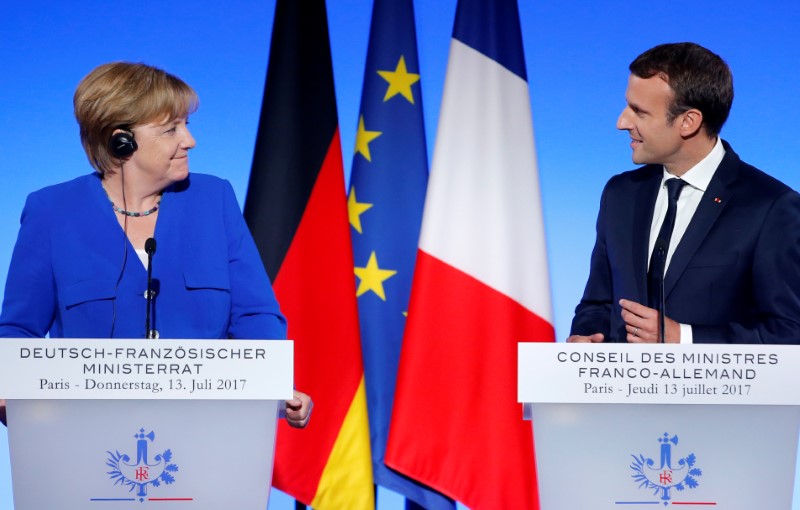By Noah Barkin and Jean-Baptiste Vey
BERLIN/PARIS (Reuters) - German Chancellor Angela Merkel struck a note of caution with respect to French calls for deeper European integration on Monday, a day before French President Emmanuel Macron lays out his plans for ambitious European reforms.
At a news conference after a German election that has forced her to consider a new coalition with the liberal Free Democrats (FDP), a party critical of Macron's ideas on Europe, Merkel said her conservative CDU/CSU bloc would support sensible measures but also wanted to see countries become more competitive.
"I'm not going to rule out anything or set red lines," she said when asked how much scope she still had to compromise with Paris following the election results.
"The union (her conservatives) will support what makes sense. My view is that we can use more Europe, but this has to lead to more competitiveness, more jobs and more clout for the European Union."
Her reserved tone may unsettle Macron, 39, who since his own election victory in May has spoken of working with Merkel, 63, on a fundamental overhaul of the EU, including the possibility of creating a eurozone budget, a eurozone finance minister and a preemptive fund to help countries in trouble.
Macron will set out his vision in a speech at the Sorbonne University in Paris on Tuesday. Elysee officials said Macron would push ahead with the idea of a eurozone budget despite stiff opposition from Germany's fiscally conservative FDP.
One Elysee official said that since a eurozone budget would "be necessary in due course", Macron felt it worthwhile to broach the issue, which he hoped would be taken into consideration during Germany's coalition negotiations.
In Berlin, Merkel alluded to Macron's speech, saying it was important to move beyond "slogans" such as eurozone budget and eurozone finance minister, and to focus on details.
"It is not about the slogans but what lies behind them," she said. "I am talking about this with the French president."
Merkel has sent conciliatory signals to Macron since his election, when he ran on a pledge to "relaunch" Europe together with Berlin. But Sunday's election result means her room for maneuver is likely to be curtailed, depending on what agreement is reached with her eventual coalition partners.
DELICATE TALKS TO COME
Merkel's conservatives remain the biggest bloc in the new Bundestag, or lower house, but will end up with fewer seats after suffering a decline in support. She is expected to seek a coalition with the FDP and the Greens.
Such a coalition, unprecedented at the national level, is likely to face opposition in the Bundestag when it comes to any major EU reform ideas.
The FDP has called for a phasing out of Europe's ESM bailout fund and changes to EU treaties that would allow countries to leave the euro zone. And the far-right, eurosceptic Alternative for Germany is now the third biggest party in the Bundestag, further curbing Merkel's room for maneuver.
It may take months before a coalition agreement is signed. But once it is, its contours are strict, effectively setting limits on the chancellor's ability to act.
Merkel said Europe would play a role in the coalition negotiations and that it would be important to sound out the FDP. FDP leader Christian Lindner said he would not agree to any coalition that did not promise a change in the German government's direction.
While that appeared to set the stage for tough talks, he also offered some hope for Macron, saying when asked about the French president's eurozone budget ideas that the FDP had a "strong interest" in the strength of France.
Elysee officials noted that the FDP had reaffirmed its attachment to the EU and strong Franco-German relations, a point Macron was likely to emphasize in his speech.

Macron, the sources said, would propose that the whole EU move forward together, and that those who did not want to do so should not stand in the way of those that did.